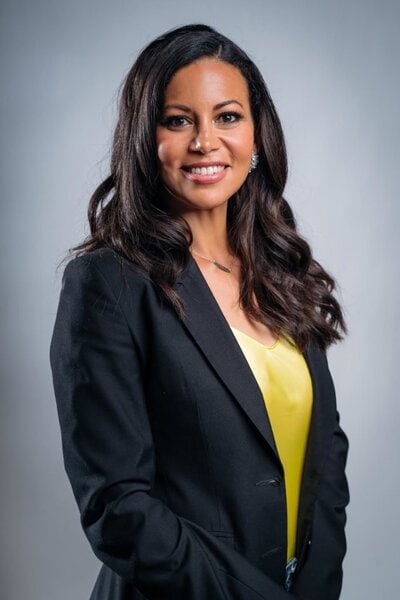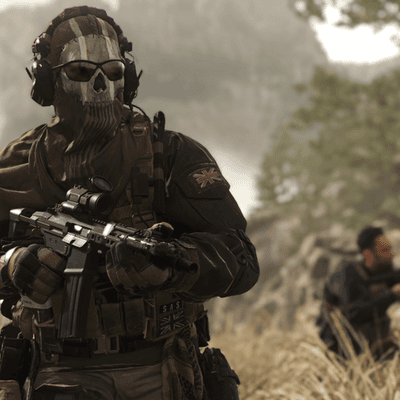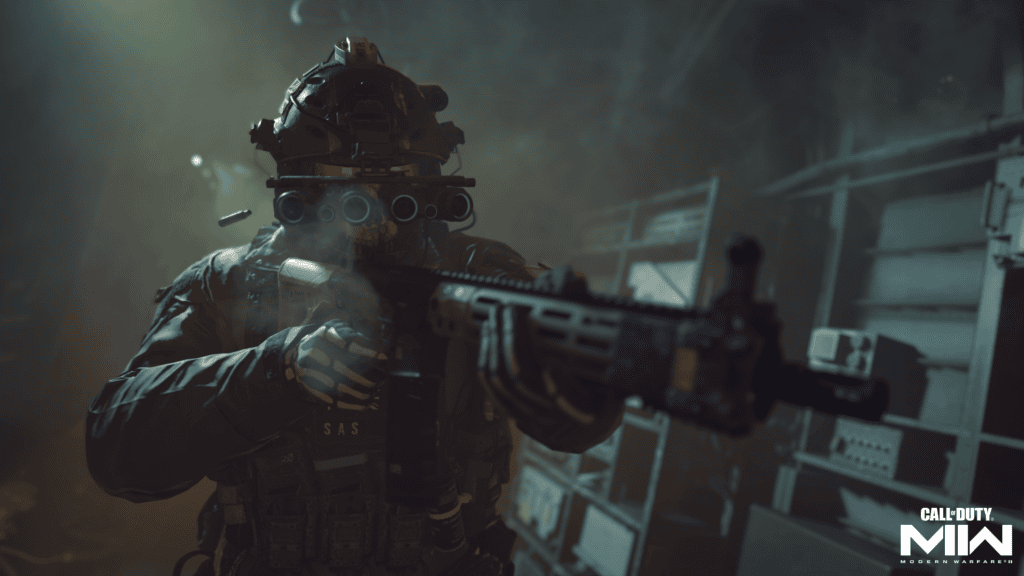The Activision Blizzard executive spoke with Boardroom about the franchise’s upcoming drop, how she landed her role leading the first-person shooter franchise, and much more.
Johanna Faries has been leading the team behind the Call of Duty video game franchise at Activision Blizzard for the past year and a half, and her path to this role is more fitting than one may think.
Faries is the Senior Vice President and General Manager of the Call of Duty franchise. She previously worked in various executive roles at the NFL before making a transition to the gaming industry. Faries drew several parallels between the businesses of sports and gaming, but one aspect she enjoys most about working with the team at Call of Duty is everyone’s grit for making it great.
“What’s so cool is we often say a lot of people here at the franchise run into the fire; they don’t run away from it,” Faries told Boardroom in an exclusive interview.
The gaming company’s hard work continues to pay off because of that mentality.
The CoD franchise has generated over $30 billion in revenue since its inception in 2003 — but that’s not the only big number to be aware of :
● Over 425,000,000 Call of Duty units sold
● Over 125,000,000 players in Call of Duty: Warzone since launch
● Over 650,000,000 Call of Duty Mobile downloads globally since launch
All of this success comes as the franchise gears up for the retail release of Call of Duty: Modern Warfare II on Oct. 28. This week, Activision Blizzard announced that early access beta testing for the new video game will begin on Sept. 16.
In the run up to the big roll-out, Boardroom spoke to Faries about her role in leading the business behind the iconic first-person shooter franchise, how she got into gaming both personally and professionally, and a few exciting tidbits about the fast-approaching release of Modern Warfare II.
This interview has been edited for length and clarity.
MICHELAI GRAHAM: As Senior Vice President and General Manager of Call of Duty, what does your job entail?
JOHANNA FARIES: Every day is different. It’s a very dynamic role, but effectively I’m dot-connecting, cross-functionally.

I steward the Call of Duty franchise, and we think day in and day out about what content we’re putting out into the world for players across every major platform. So we’ve got console players who have a certain type of experience that’s very different from our COD mobile community.
It’s really working cross-functionally and very collaboratively with the development studios, who obviously are the creative geniuses behind all things Call of Duty and the gameplay that we all know and love, but also thinking commercially and thinking about the consumer and marketing and what are the big beats, as we often call them, that we bring forward to communities all over the world to make them even more excited, more engaged, [and] more willing to tell friends to squat up and drop in.
Warzone has been such a big part of the last couple of years of our growth, right? So now, we have this whole battle royale type of experience. That’s very new to Call of Duty in addition to what we’ve been so popular for and well-known for on the other aspects of our gameplay. It’s a big job. It’s always moving a mile a minute, but it’s very exciting and I love it.
MG: Let’s backtrack a little bit. Can you talk to me about how you got into working in the gaming industry?
JF: It’s definitely fun, but it’s also challenging and complicated. When I actually started my executive career, I was in traditional sports, so I worked at the National Football League; I was at the league office of the NFL over in New York.

What’s interesting about that jump is [that] I really came through the esports landscape — thinking about sports and entertainment and fan development and community engagement, they’re very similar themes.
If you think about, you know, how do you scale a global franchise and continue to marshal it into new vectors for growth, [and] new reasons to develop younger fans? So, a lot of the questions or challenges that I might have been facing as a business executive over at the NFL weren’t all that dissimilar to how I think about challenges here on the team for the franchise for Call of Duty, where it’s all about community fandom.
How do you maintain tradition in ways that matter while also pushing innovation and newness and appealing to new audiences? And the way in which Call of Duty as a brand sits at the nexus of entertainment culture, where you have Hollywood A-listers, you’ve got top athletes, you’ve got us showing up in film and fashion and all these other ancillary and adjacent fields, if you will, in addition to being such a behemoth and gaming has been super cool and something that was really appealing to me when I was making the jump.
MG: This might be a silly question, but are you a gamer yourself?
JH: I am, and I’ve actually always grown up a gamer in many ways. I grew up more, I would say, on the Nintendo, Super Mario Bros., Sega, [and] even Oregon Trail, if that ages me. And the Zeldas of the world, I loved them all.
I really only came into Call of Duty, of course, later on when it was launching in the early 2000s. And it’s interesting, ’cause as much as I enjoy playing and always have, I’m pretty terrible. I’m pretty average. I’m a very casual-skewing Call of Duty player, but I love it. You know, I drop in all the time.
I love Warzone. I love what we’ve done in the last few years to really expand on the gameplay. I typically skew more Campaign, as we’d say; I love the episodic, cinematic sort of narrative story experience, a single-player experience. I also love watching other people who are really, really good at Call of Duty, so this translates well into the types of events that you’ve now clicked into on the esports side or watching the best of the best play. I love that because I don’t feel as much pressure to be great, but I can watch the greatest in the world rock in Call of Duty, which is really cool.
MG: What’s the most challenging aspect of your job?
JH: I say the challenge oftentimes is, again, back to that dot-connecting; it’s such a cross-functional behemoth. There are so many different parts of our workforce that have to be brought into alignment, so how do I foster healthy, challenging debates around where we want to take the future of the franchise?
What does good, better, best look like? Are we all rowing in the same direction? And sometimes ,frankly, we’re not — and that’s true of any major franchise, especially a commercial operation, as big as Call of Duty. It’s really incumbent on me to be resilient and foster resilience within my team of leaders as well to say, we’re gonna have moments that shine bright, we’re gonna have moments where maybe it’s not our best foot forward, or we do have to get better.
MG: How do you envision success in your current role? What does that look like for you?
JH: I am all about the people. To be honest, I really think about how my team is feeling [and] operating. Do they feel that they have the support that they need to do their best work? And if that holds true, then all the metrics and the KPIs and the things that we can measure as a business will follow from that, right? Because I think one of the biggest blessings of being in the roles is that I’m surrounded by the best and brightest truly around so much of the gaming industry and more. And so it’s about really fostering ‘are they feeling the mojo?’ Are they feeling like they’re clear, they have the support they need? Do they have the space to have psychologically safe conversations? Do they have a culture where they think they can thrive? Do they have the ability to hire their best talent and foster their own empowerment?
And so, really focusing in on how are we as a team and thinking about the empathy that’s required to make sure that they can level up and flex and innovate and take some risks and know that they can take some risks and still feel supported and safe in doing so. That will be, to me, a benchmark of success.
I think outwardly from a community perspective, have been really focused on transparency and [saying] ‘let’s be more honest.’ Let’s really think player-first again; what would a player say honestly about Call of Duty this week? Good, bad, ugly, you know, something we haven’t yet imagined. And if we’re more honest with ourselves and in our communications with our community, with our streamers, with content creators, with our partners, [then] the more receptive they’re gonna be, I think to us being able to move with them versus being isolated or distant in our communication from the community that we serve.
I’ve really pushed that agenda as well around what success looks like for us needs to be a little bit more about transparent proximity and partnership with our creative community and with the players that play this game. And I think that’s bored a lot of fruit for us recently and I think we’re gonna continue in that regard.
MG: We know you’re not overseeing the Call of Duty League anymore, but the championship weekend just happened. How do you feel about this year’s tournament?
JH: I am thrilled. I was there on day one, and it was so exciting. I couldn’t be more proud of the team.
I think it’s been now three good years of this emerging product, this vision that we hold. And it’s so exciting again, back to people, to just see how many amazing leaders have come in since I’ve joined as well to really marshal this and polish it and level up.
And so it sold out. It’s loud in there. We’ve got amazing gameplay. The viewership is growing year over year. It’s everything we wanted to see and more.
MG: What can you tell me about the upcoming Modern Warfare II release in October?
JH: The last year and a half has been all about preparing, frankly, for this moment we’re undertaking right now. For anyone who doesn’t know — hopefully, everybody all over the world has already heard — we have a major new release in Modern Warfare II coming out, and Modern Warfare just in general is a title within the franchise that has such incredible fandom and built-in passion within the Call of Duty ecosystem.
There is just so much hype around this moment of Modern Warfare II coming out into the world. We’re really heads down, all eyes on Oct. 28th and the launch of that game. We have a few things up our sleeves in the coming weeks and months to continue to peel back the layers of making this as big a blockbuster as we hope it will be.

Those cycles really started around the time that I was transitioning into the general manager role. So, you know, we’re years out on this stuff. Our development teams are really thinking long-term because the richness of the gameplay frankly deserves that.
We talk a lot about how Modern Warfare II, in many ways, is a step-change moment for the entire franchise. I say that because we’re really thinking about how much Call of Duty as a franchise has expanded in the last few years. So just purely from a gameplay perspective, the realism, the range of play; it’s really just a going be in a stunning game in many ways and really leveling up the technology there. But there’s also this interconnectedness with a brand new Warzone experience.
MG: What can fans expect from Call of Duty next?

JH: Mobile is such a huge part of our strategy going forward. We have a lot more to say about a new mobile experience that ties into this and more, and so we’ve really thought expansively around how we connect and unite all Call of Duty players in a more sophisticated way, and what are the tech innovations that gameplay innovations, frankly, the marketing innovations and partnerships that need to be true for that to feel less siloed and fractured and more of a page turn that speaks to the sophistication and the up-leveling of the entire franchise experience.
So, [I’m] really excited about this because I think it’s got real scale that goes even well beyond what Modern Warfare II — the game itself, on 10/28 — will represent for our community. And I think it’ll have reverberations hopefully for years to come.
MG: What are some short and long-term goals you want to accomplish at Call of Duty?
JH: Look, I think for us, it’s always about excellence for our players, right? And it’s easier said than done. It might sound cliché, but we’re going on [becoming ] a 20-year-old brand, and in many ways, we’re our own biggest, most complex competition because it’s been so dominant in many ways that you’re always reaching for more. But the bigger you get, the harder sometimes it is to really figure out — where do you grow and how do you keep leveling up? So, for me, the next year is really gonna be again very similarly about ‘let’s launch these new, amazing experiences into the field of play.’
The more we can think as one team — one dream, as they often say — the better we’re all gonna be for it. Yeah. So I hope that I look back and that the team looks back even a year from now and starts to say, yeah, we’ve really started to unify this community.
Long-term, obviously, it’s always about growth. We are so well positioned in the marketplace to continue, to dominate and command more space and light up in regions maybe that Call of Duty hasn’t been as dominant before. Even when you think regionally and internationally speaking, but of course across all the platforms that are gonna matter. I think all the right minds are thinking about ‘what does growth really look like?’ How do we measure that? How do we articulate that in a way where all these people are rowing in the same direction again, and how do we hire the best and brightest talent to help us do it? It’s about really executing and really, really being honest and, on top of it and being able to be agile, if needed; to pivot with the times.